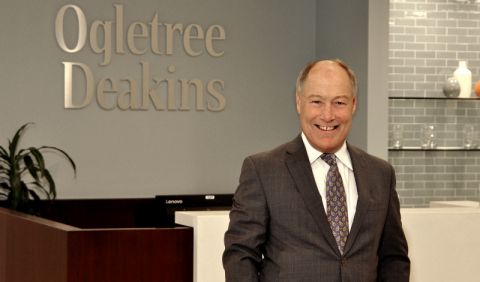
It was no small gamble. In January 2016, Hugh Christie, Law’81 (Artsci’78), left his secure position as head of the labour employment group at Gowling WLG in Toronto to become managing partner in the new Toronto office of Ogletree Deakins Nash Smoak and Stewart PC, Atlanta-based management-side labour and employment law specialists.
“Until then, I was pretty ‘settled’ in my legal career. I’d even had the same office phone number for 35 years,” Christie recalls with a laugh. After graduation, he’d articled and then begun practising with Smith Lyons, rising to partnership. Following Smith Lyons’ 2001 merger with Gowlings, he headed up that firm’s labour employment group for 13 years.
Although his stellar national reputation as a top labour and employment lawyer kept him very busy, Christie came to an insightful conclusion: Canada’s shifting economic tides and the legal profession being reshaped by the creation of larger and larger firms were making it increasingly difficult for practitioners in his field to function within full-service law firms. “There were more and more conflicts of interest developing with practitioners and their clients in other areas,” he explains.
That’s why, when Gowlings merged with British firm Wragge Lawrence Graham & Company in early 2016, Christie knew it was an opportune time to recast his career plans. He, his long-time assistant, and two Gowlings colleagues (Michael Comartin, MIR’08/Law’11, for one) joined Ogletree, opening the firm’s first Canadian – and fourth international – office. This leap of faith on Christie’s part is paying off big time for both him and Ogletree, he says.
“Canadian employers increasingly value easy access to international labour and employment law advice at a firm they’re familiar with, while international employers operating in Canada see a real benefit in accessing expert Canadian advice through their usual local advisors,” Christie observes.
“We now have 12 people in Toronto, we’re about to open a Montreal office, and we have five new lawyers ‘in the pipeline,’ including Shir Fulga, Law’18, and Caroline DeBruin, Law’20. I can’t speak highly enough of my experiences with Ogletree. The firm has been very respectful of any Canada-U.S. differences. My partners are tremendous people. It feels like home. Things have worked out wonderfully for us.”
He likes feeling relatively settled again, since stasis was something scarce in his early life. Son of a globe-trotting physicist, he’d lived in his Halifax hometown, England and India before his family settled in Ottawa in the late 1960s.
A gifted student, he could have gone to any university, but he’s never regretted choosing Queen’s. Vitally involved in campus life, he was elected President of the AMS (1977-78) and Rector (1978-80), only the fifth student to hold the historic rectorship and the only person in Queen’s 178-year history ever to serve in both roles.
Since graduation, he has maintained close ties to his alma mater as a generous benefactor, President of the world-wide Alumni Association (1987-89), a University Councillor (1980-1992), a Council-elected Trustee (1991-2007), Trustees Vice-Chair (2004-07), and, since 2010, as founding Co-Chair of the Queen’s Centre for Law in the Contemporary Workplace.
Apart from his wife Debra Haak (a lawyer and a Queen’s Law PhD candidate) and their three children, Queen’s, particularly the law school, is one of Christie’s greatest loves. That affection is mutual; his honours include the AMS’s Tricolour Award (1978), the University Council’s Distinguished Service Award (2007), and Queen’s Law’s HRS Ryan Law Alumni Award (2011).
“For me,” Christie says, “the overarching characteristic of Queen’s Law is that it doesn’t just teach the black letter of the law, but also teaches that at its core the law is about solving people’s problems. My professors underscored that idea – especially Dan Soberman, Ron Delisle and Allan Manson. They played huge roles in making me the person I am today.”
By Ken Cuthbertson, Law’83